 ICRH Global Newsletter ICRH Global Newsletter
30th of September, 2013 |
PROJECTS |
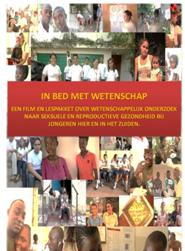 Launch educational package ‘In bed with science’. Launch educational package ‘In bed with science’.
In September ICRH Belgium launched the educational package ‘In bed with science’. ‘In bed with science’ hopes to sensitize young people on the importance of scientific research and wants to improve knowledge and raise public opinion on sexuality and sexuality education for young people here and in the South.
In bed with science is an educational package (2*50min) for teachers of the third grade of secondary high school. The package consists of an educational video and related questions (and answers) which enable teachers to guide discussions on (the importance of) scientific research and the social services it can lead to, as well as on (the importance of) sexuality and sexuality education here and in the South. The video brings into vision research on adolescent sexual and reproductive health in Kenya and Nicaragua. Some research interventions - conducted by adolescents - such as workshops on sexual and gender based violence in Nicaragua and elements of the work of peer educators in Kenya are shown. Furthermore diverse social services, which are results of former research projects, are presented. For more information please contact: SaraA.demeyer@ugent.be
‘In bed with science’ is only available in Dutch and can be downloaded here: http://icrhb.org/project/bed-science-bed-met-wetenschap
|
INPAC meetings
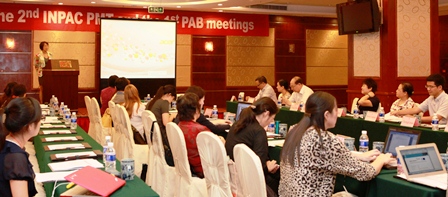 From 21 to 24 September, the 2nd INPAC Project Management Team meeting and the first Policy Advisory Board meeting took place in Chongqing, China. From 21 to 24 September, the 2nd INPAC Project Management Team meeting and the first Policy Advisory Board meeting took place in Chongqing, China.
INPAC is a collaborative research project under the European Commission (EC) Seventh Framework Programme (FP7), aiming to integrate post-abortion family planning services into existing abortion services in hospital settings in China and to evaluate the effect of the interventions in terms of reduction of unintended pregnancies and repeat abortions.
The first phase of the project consisted in a detailed situation analysis on the provision and utilization of abortion services in China, including a critical policy review and quantitative and qualitative surveys in 300 hospitals in 30 provinces, municipalities and autonomous regions of mainland China. The results of this first phase were presented at a Project Management Team meeting in Chongquing, and the next phase of the project, which consists of interventions, was prepared by discussions on the scientific and practical aspects of the intervention design. At the end of the meeting, a publication plan on the findings of the situation analysis was decided upon.
The Policy Advisory Board meeting of the INPAC project took place in the same place and period as the Project Management Team meeting. At the end of December 2013, the results of the situation analysis will be presented at a national workshop in Beijing to health providers from 30 provinces. This workshop will also mark the launch of the intervention implementation phase of the project.
More information: weihong.zhang@ugent.be and shuchen.wang@ugent.be
Project website: www.inpacproject.eu |
PMA2020
ICRH Kenya was appointed country coordinator for PMA2020 in Kenya
PMA2020 is a project funded and implemented by the Bill & Melinda Gates Institute for Population and Reproductive Health at the Johns Hopkins Bloomberg School of Public Health. It is designed to facilitate annual progress reporting in support of the goals and principles of FP2020 across 10 countries in Africa and Asia, using an innovative mobile- Assisted Data and Dissemination System.
Data will be collected at both household and facility levels via mobile phones through a net-work of sentinel resident enumerators in nationally representative clusters. Enumerators transfer data by phone to a central server via the GPRS network. In real-time, data are validated, aggregated and prepared in tables, graphs, and maps and pushed for use by community and other stakeholders.
The PMA2020 project will run in Ghana, Ethiopia, Uganda, Nigeria, DR Congo, Kenya, Senegal, Burkina Faso, India and Indonesia.
More information: Peter Gichangi, Peter@icrhk.org |
EVENTS
|
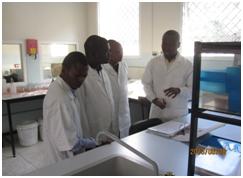 Good Clinical Laboratory Practices training at ICRH Kenya Good Clinical Laboratory Practices training at ICRH Kenya
In June 2013, the ICRH Kenya clinical research laboratory conducted its debut good clinical laboratory practice (GCLP) training to laboratory experts.
The 3-day course provided the framework of guidance on the current recommended guidelines of proper running and management of laboratories and was pitched as an opportunity for individuals wanting career in laboratory science and technical staff needing refresher training. GCLP certification is highly regarded as a prerequisite to working in most research laboratories. By organizing this course, ICRH Kenya aims to instigate and improve appreciation of quality issues amongst laboratory personnel.
The course was delivered through lectures, workshop discussions and demonstrations over facility tour. This initiative, though not widely publicized, had an exciting response from interested experts across the nation and received very positive feedback from the participants. The coordinating team is currently implementing feedback recommendations to reach more participants with future events. More information: Sammy Wambua, Sammy@icrhk.org
|
Big step forward in the establishment of a Medical School in Mombasa
From 19 to 22 August, an international workshop was held to develop the curriculum of the Medical School that is being established within the Technical University of Mombasa (TUM). 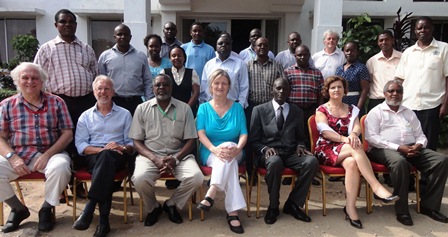 In 2012, the Technical University of Mombasa, ICRH Kenya and Ghent University signed a Memorandum of Understanding in which they committed to join forces to establish a medical faculty in Mombasa. Currently, there is no university training programme for medical doctors in the entire region, where the need for skilled medical staff is however very high. In 2012, the Technical University of Mombasa, ICRH Kenya and Ghent University signed a Memorandum of Understanding in which they committed to join forces to establish a medical faculty in Mombasa. Currently, there is no university training programme for medical doctors in the entire region, where the need for skilled medical staff is however very high.
An important step in the establishment is the development of a curriculum for the training of medical doctors, and this was done from 19 to 22 August in a joint workshop with TUM management and academic staff, ICRH Kenya representatives (prof. Peter Gichangi, dr. Kishor Mandaliya, Lou Dierick), and two professors of Ghent University (prof. Katharina D’Herde and prof. Anselme Derese) who provided expert advice based on their experience with the renowned medical doctors’ training of the Faculty of Medicine and Health Sciences of Ghent University. Prof. Marleen Temmerman, who played an important role in initiation the project, also attended the workshop.
The ambition of TUM is to be ready by September 2014 to enrol the first medical students in an innovative, challenging and community oriented 6 years training programme.
|
Estimating the prevalence of FGM in the European Union
 Els Leye presented a paper ‘Towards a better estimation of the prevalence of FGM in the European Union’ at the XXVII IUSSP International Population Conference in Busan, South Korea.The paper was presented in the panel ‘Harmful traditional practices: female genital mutilation and other practices’. The International Union for the Scientific Study of Population (IUSSP) is the only international professional association of population specialists, and organizes an international conference every four years. It has more than 2.000 members and 600 student associates located in more than 130 countries. Els Leye presented a paper ‘Towards a better estimation of the prevalence of FGM in the European Union’ at the XXVII IUSSP International Population Conference in Busan, South Korea.The paper was presented in the panel ‘Harmful traditional practices: female genital mutilation and other practices’. The International Union for the Scientific Study of Population (IUSSP) is the only international professional association of population specialists, and organizes an international conference every four years. It has more than 2.000 members and 600 student associates located in more than 130 countries.
More information: Els Leye, els.leye@uugent.be |
Family planning in Maputo, Mozambique
ICRH Mozambique’s project ‘Building knowledge for improved quality of services and community involvement to increase use of Family Planning in Maputo Province’ had its first steering committee meeting.
Improvement of maternal health is one of the highest priorities of the Ministry of Health of Mozambique. It aims to achieve this through increased use of family planning and contraception among others strategies. However health system barriers and socio-cultural factors are still impeding both access and use of modern family planning by couples. The project approved by FICA in December 2012 aims at identifying and proposing actions to overcoming the existing obstacles within the health system, principally developing and implementing innovative service delivery models after a thorough situation analysis. The project foresees a strong monitoring component, to measure changes in acceptance, access and use of modern family planning methods as well as to measure its impact on selected Millennium Development Goals, mainly reduction of infant and maternal mortality.
The first steering committee meeting took place on 16 May 2013, with the participation of the provincial and district directorates of Health, of NGOs working in the province as well as of the representative of FICA Mozambique. The project was well received by the various partners who showed interest in contributing to the situation analysis. More information: Beatrice Crahay, icrh.coord@tdm.co.mz |
ICRH PEOPLE |
Vernon Mochache Oyaro
In September 2013, Dr. Mochache has joined ICRH Kenya.
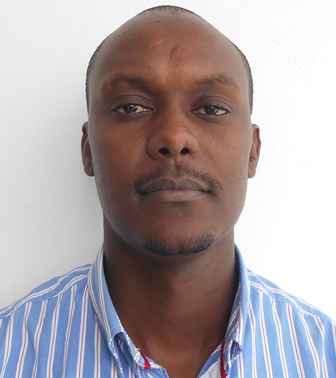 Vernon Mochache is a medical doctor with graduate training in epidemiology and global health. He has experience in conducting research and providing sexual and reproductive health services to women in rural Kenya as well as high-risk women in Mombasa, Kenya. Previously, Dr. Mochache has been responsible for the conduct and management of different research studies ranging from cross-sectional to randomized controlled trials. As the medical officer in charge of a rural hospital, Dr. Mochache supervised the provision of health care to pregnant mothers, infants and children under-five, including provision of PMTCT and ART services. He was also involved in the roll-out of youth-friendly VCT centers as well as epidemiologic surveillance of TB, HIV and other STIs. He is interested in a research career that predominantly involves studying and influencing the epidemiology of major causes of morbidity and mortality among women and their children. Vernon Mochache is a medical doctor with graduate training in epidemiology and global health. He has experience in conducting research and providing sexual and reproductive health services to women in rural Kenya as well as high-risk women in Mombasa, Kenya. Previously, Dr. Mochache has been responsible for the conduct and management of different research studies ranging from cross-sectional to randomized controlled trials. As the medical officer in charge of a rural hospital, Dr. Mochache supervised the provision of health care to pregnant mothers, infants and children under-five, including provision of PMTCT and ART services. He was also involved in the roll-out of youth-friendly VCT centers as well as epidemiologic surveillance of TB, HIV and other STIs. He is interested in a research career that predominantly involves studying and influencing the epidemiology of major causes of morbidity and mortality among women and their children.
Dr. Mochache will be the team lead for MOMI activities and he will also be supporting other projects with clinical work. |
Dr. Kishor Mandaliya received a Belgian distinction
On August 23, former ICRH Director of Science and Research dr. Kishor Mandaliya was decorated in the Order of Leopold the First of Belgium. 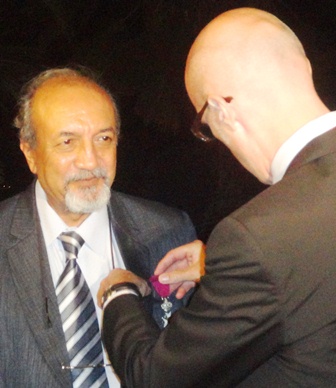 Dr. Mandaliya has dedicated his whole career to improving public health in Kenya and beyond. He holds an MBChB from the University of Nairobi and is member and fellow of the Royal College of Pathologists. He is the coordinator of the HIV Care Clinic and director of the Research Laboratories of the Coast Provincial General Hospital, Mombasa. Prior to his current position, he served as the provincial pathologist for Coast Province for a period of 25 years. He has a longstanding research experience in reproductive health and is highly and widely appreciated as an inspiring teacher, a committed pathologist and a skilled research manager. Dr. Mandaliya has dedicated his whole career to improving public health in Kenya and beyond. He holds an MBChB from the University of Nairobi and is member and fellow of the Royal College of Pathologists. He is the coordinator of the HIV Care Clinic and director of the Research Laboratories of the Coast Provincial General Hospital, Mombasa. Prior to his current position, he served as the provincial pathologist for Coast Province for a period of 25 years. He has a longstanding research experience in reproductive health and is highly and widely appreciated as an inspiring teacher, a committed pathologist and a skilled research manager.
Kishor Mandaliya is one of the founders of ICRH Kenya, and he contributed greatly to the development of the organization and to the cooperation between Kenya and Belgium in the field of health. He was awarded the Order of Leopold I through Mr. Bart Ouvry, the Belgian Ambassador in Kenya. The Order of Leopold I is named in honour of King Leopold I. The Order is granted as a reward for exceptional and longstanding services to the Belgian people. |
Els Leye and Olivier Degomme appointed as professor
From October 2013 on, dr. Els Leye and Olivier Degomme will be appointed professor at ICRH/Ghent University.
 Els has been working for ICRH/Ghent Unversity since 1997, mostly on research projects in the field of harmful cultural practices, and more specifically on female genital mutilation, in which field she is an internationally renowned expert. She holds a Masters diploma in Socio-Cultural Sciences and obtained in 2008 a PhD in Comparative Sciences of Culture, with a dissertation on ‘Female genital mutilation. A study of health services and legislation in some countries of the European Union’. More information: els.leye@ugent.be Els has been working for ICRH/Ghent Unversity since 1997, mostly on research projects in the field of harmful cultural practices, and more specifically on female genital mutilation, in which field she is an internationally renowned expert. She holds a Masters diploma in Socio-Cultural Sciences and obtained in 2008 a PhD in Comparative Sciences of Culture, with a dissertation on ‘Female genital mutilation. A study of health services and legislation in some countries of the European Union’. More information: els.leye@ugent.be
Olivier joined ICRH/Ghent in 2011 as Scientific Director and Post- doctoral researcher within the Faculty. He holds an MD and MPH, and obtained a PhD from the catholic university of Louvain where he defended his doctoral research on mortality patterns in conflicts (while working at the Centre of Research on the Epidemiology of Disasters). Olivier will be appointed as professor in Global Health with a focus on Global Reproductive Health. More information: olivier.degomme@ugent.be |
Kristien Michielsen
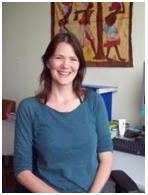 From September on, Dr. Kristien Michielsen was appointed postdoctoral assistant at ICRH. From September on, Dr. Kristien Michielsen was appointed postdoctoral assistant at ICRH.
Kristien is a political scientist who has worked until the end of 2012 as an ICRH PhD fellow on the effectiveness of HIV prevention for young people in sub-Saharan Africa and the determinants of sexual risk behaviour. On 9 November 2012, she successfully defended her PhD thesis ‘HIV prevention for young people in sub-Saharan Africa: effectiveness of interventions and areas for improvement. Evidence from Rwanda’. As a doctoral assistant, Kristien’s tasks at ICRH include providing support in quantitative and qualitative research and data analysis, supervising masters and PhD students and contributing to proposal writing and education.
More information: kristien.michielsen@ugent.be |
PUBLICATIONS
|
The impact of education and globalization on sexual and reproductive health
This study qualifies the relationship between sexual and reproductive health (SRH) and educational attainment in eastern and southern Africa.
The authors hypothesize that the regional level of globalization is a moderating factor in the relationship between SRH and educational attainment. Using retrospective data from Kenya, Malawi, Tanzania, and Zambia, the associations between SRH (eight indicators), educational attainment, and globalization were examined using multilevel logistic regression analysis. It was found that the model fit for every SRH outcome indicator increased significantly after including the interaction between globalization and educational attainment, supporting the hypothesis.
Marie-Anne Van Stam, Kristien Michielsen, Koen Stroeken & Bonne J.H. Zijlstra. The impact of education and globalization on sexual and reproductive health: Retrospective evidence from eastern and southern Africa. AIDS Care. 2013 Aug 7. [Epub ahead of print] http://www.tandfonline.com/doi/abs/10.1080/09540121.2013.824540?url_ver=Z39.88-2003&rfr_id=ori:rid:crossref.org&rfr_dat=cr_pub%3dpubmed& |
Sexual Risk Taking and Violence among Female Sex Workers in Mombasa, Kenya
This cohort study aimed to assess sexual risk-taking of female sex workers (FSWs) with emotional partners (boyfriends and husbands), compared to regular and casual clients. Experiences of violence and the degree of relationship control that FSWs have with emotional partners are also described.
Four hundred HIV-uninfected FSWs older than 16 years were recruited from their homes and guesthouses in Mombasa, Kenya. A structured questionnaire assessed participant characteristics and study outcomes at each visit, and women received risk-reduction counseling, male and female condoms, and HIV testing.
Four or more unprotected sex acts in the past week were reported by 21.3% of women during sex with emotional partners, compared to 5.8% with regular and 4.8% with casual clients (P,0.001). Total number of unprotected sex acts per week was 5–6-fold higher with emotional partners (603 acts with 259 partners) than with regular or casual clients (125 acts with 456, and 98 acts with 632 clients, respectively; P,0.001). Mostly, perceptions of ‘‘trust’’ underscored unprotected sex with emotional partners. Low control over these relationships, common to many women (36.9%), was linked with higher partner numbers, inconsistent condom use, and being physically forced to have sex by their emotional partners. Half experienced sexual or physical violence in the past year, similarly associated with partner numbers and inconsistent condom use. The authors conclude that high-risk sexual behaviour, low control and frequent violence in relationships with emotional partners heighten FSWs’ vulnerability and high HIV risk, requiring targeted interventions that also encompass emotional partners.
Luchters S, Richter ML, Bosire W, Nelson G, Kingola N, et al. (2013) The Contribution of Emotional Partners to Sexual Risk Taking and Violence among Female Sex Workers in Mombasa, Kenya: A Cohort Study. PLoS ONE 8(8): e68855. doi:10.1371/journal.pone.0068855 |
Toward a new concept of ‘‘natural balance’’ in oral estroprogestin contraception
Next steps in low-dose combined oral contraceptives (GOCs).
The Pill has undergone many changes since its first appearance some 50 years ago. Key developments included the reduction of ethinylestradiol doses and the synthesis of new progestins in order to increase safety, compliance and efficiency. COCs are currently the preferred option for millions of women. Due to this widespread use, it has been argued that the safety of COCs should be even better, raising the threshold for excellence. Yet in spite of major improvements, there is still an associated risk of venous thromboembolism (VTE). The next step in COCs’ evolution should take total estrogenicity and hepatic estro-androgenic balance into account. The focus on the estrogencomponent – which has not changed in 50 years – has yielded a new class of natural estrogen pills. Following the introduction of a first quadriphasic pill, a monophasic estradiol pill based on the concept of ‘‘natural balance’’ was subsequently made available. These recent achievements could represent a step forward in the evolution of COCs and pave the way for better safety.
Nathalie Chabbert-Buffet, Jan Gerris, Christian Jamin, Stefano Lello, Inaki Lete, Paloma Lobo, Rossella E. Nappi, and Axelle Pintiaux. Toward a new concept of ‘‘natural balance’’ in oral estroprogestin contraception. Gynecol Endocrinol.2013 Aug 9. [Epub ahead of print] |
Screening pregnant women for intimate partner violence during antenatal care in Zimbabwe
Pregnancy offers an opportunity for midwives to recognize and respond to women experiencing intimate partner violence (IPV). However, most antenatal care interventions have been conducted in private specialist services in high-income countries and do not address the structural and cultural realities of developing country settings.
This paper reports on an exploratory qualitative study conducted in antenatal public health facilities in Harare, Zimbabwe, involving six in-depth interviews with midwives and seven focus group discussions with 64 pregnant and postpartum women. Recorded interviews were transcribed verbatim and analyzed using thematic content analysis. The authors found that identifying and responding to IPV in antenatal care is hampered by inadequate human, financial and infrastructural resources as well as poor support of gender-based violence training for midwives. Midwives had divergent views of their role, with some perceiving IPV as a non-clinical, social and domestic problem that does not require their attention, while others who had been sensitized to the problem felt that it could easily overwhelm them. A comprehensive response to IPV by midwives would be difficult to achieve in this setting but sensitized midwives could respond to cues to violence and ultimately assist abused women in culturally sensitive and appropriate ways.
Simukai Shamu, Naeemah Abrahams, Marleen Temmerman and Christina Zarowsky. Opportunities and obstacles to screening pregnant women for intimate partner violence during antenatal care in Zimbabwe. Cult Health Sex. 2013;15(5):511-24. Epub 2013 Jan 23. |
ART initiation in Africa
Wim Delva, Yvette Fleming and Lois Chingandu published a Viewpoint article on the question in reaction to the opinion piece by De Cock and El-Sadr that was published a few months earlier in NEJM, in which they stated that an African RCT is urgently needed, in order to "definitively settle" the question of optimal timing of ART initiation in Africa.
Delva et al. fundamentally disagree with this opinion and argue that inaction while waiting for the results of such a trial is unjustified. While they do not oppose their call for an African randomised controlled trial to better understand the health benefits and risks of earlier ART initiation, they make the case for a fundamentally different approach to ART initiation in Africa, centred on the patient’s right to decide when to start ART, in consultation with his or her health care providers, and guided by all scientific evidence, including that from past, ongoing and planned implementation studies.
When to start ART in Africa, is a timely issue, especially now that the World Health Organization has launched new, consolidated guidelines on the use of antiretroviral drugs for treating and preventing HIV infection. These stipulate that ART initiation is recommended in all individuals with a CD4+ cell count of 500 cells/mL or less (but giving priority to those with advanced clinical disease or a CD4+ cell count less than 350 cells/mL); and at any CD4+ cell count in those with active TB, Hepatitis B infection and severe chronic liver disease, in HIV-positive partners in serodiscordant couples, and in pregnant and breastfeeding women.
Delva et al. welcome the new WHO guidelines and see these as a key step in the direction of offering immediate treatment to all. It will now be up to individual countries (Governments, People Living with HIV and Civil Society) to make informed decisions about when to start treatment, taking into account the entire evidence base and human rights considerations, and not primarily base decisions on RCT data or the (perceived) lack thereof.
Wim Delva, Yvette Fleming and Lois Chingandu. When to start ART in Africa – primarily guided by RCTs or patient autonomy? Journal of the International AIDS Society 2013, 16:18756.
http://www.jiasociety.org/index.php/jias/article/view/18756 |
The case for investing in family planning in the Pacific
An estimation of costs and benefits of reducing unmet need for contraception in Vanuatu and the Solomon Islands.
The authors modelled the costs and associated health, demographic and economic impacts of reducing unmet need for family planning between 2010-2025 in Vanuatu and the Solomon Islands. Baseline data were obtained from census reports, Demographic and Health Surveys, and UN agency reports. Using a demographic modelling program they compared a scenario of "no change in unmet need" with two distinct scenarios: 1) all family planning needs met by 2020; and, 2) all needs met by 2050.
Meeting family planning needs by 2020 would increase prevalence of modern contraception in 2025 from 36.8 to 65.5% in Vanuatu and 28.5 to 37.6% in the Solomon Islands. Between 2010-2025 the average annual number of unintended pregnancies would decline by 68% in Vanuatu and 50% in the Solomon Islands, and high-risk births would fall by more than 20%, averting 2,573 maternal and infant deaths. Total fertility rates would fall from 4.1 to 2.2 in Vanuatu and 3.5 in the Solomon Islands, contributing to slowed population growth and lower dependency ratios. The direct cost of reducing unmet need by 2020 was estimated to be $5.19 million for Vanuatu and $3.36 million for the Solomon Islands between 2010-2025. Preventing unintended pregnancies would save $112 million in health and education expenditure.
The authors conclude that in small island developing states such as Vanuatu and the Solomon Islands, increasing investment in family planning would contribute to improved maternal and infant outcomes and substantial public sector savings.
Kennedy EC, Mackesy-Buckley S, Subramaniam S, Demmke A, Latu R, Robertson AS, Tiban K, Tokon A, Luchters S. The case for investing in family planning in the Pacific: costs and benefits of reducing unmet need for contraception in Vanuatu and the Solomon Islands. Reprod Health. 2013 Jun 10;10:30. doi: 10.1186/1742-4755-10-30. |
| |
| |



 From 21 to 24 September, the 2nd INPAC Project Management Team meeting and the first Policy Advisory Board meeting took place in Chongqing, China.
From 21 to 24 September, the 2nd INPAC Project Management Team meeting and the first Policy Advisory Board meeting took place in Chongqing, China.  In 2012, the Technical University of Mombasa, ICRH Kenya and Ghent University signed a Memorandum of Understanding in which they committed to join forces to establish a medical faculty in Mombasa. Currently, there is no university training programme for medical doctors in the entire region, where the need for skilled medical staff is however very high.
In 2012, the Technical University of Mombasa, ICRH Kenya and Ghent University signed a Memorandum of Understanding in which they committed to join forces to establish a medical faculty in Mombasa. Currently, there is no university training programme for medical doctors in the entire region, where the need for skilled medical staff is however very high. 
 Dr. Mandaliya has dedicated his whole career to improving public health in Kenya and beyond.
Dr. Mandaliya has dedicated his whole career to improving public health in Kenya and beyond.